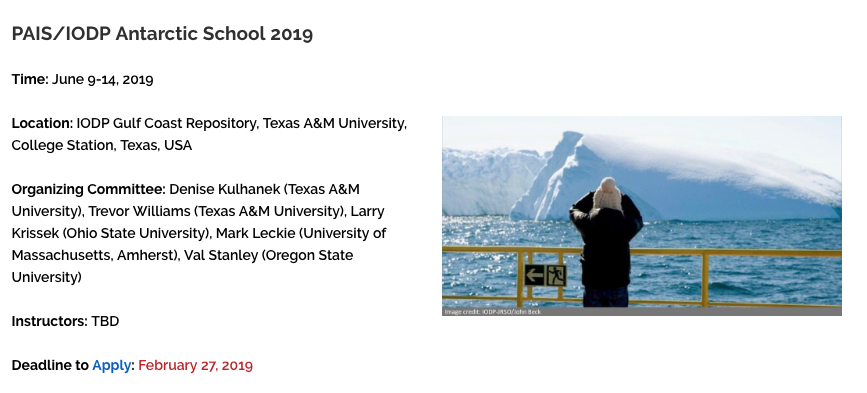
Dates: 10–14 June 2019
Location: IODP Gulf Coast Repository, Texas A&M University, College Station, Texas, USA
Deadline to apply: 27 February 2019
Website: https://usoceandiscovery.org/antarctic-school-2019/
School Objectives
IODP has embarked on a campaign to investigate Antarctica, its ice sheets, and the Southern Ocean by coring and logging shelf and deep water marine sediments. The first expedition, Ross Sea drilling with the JOIDES Resolution (Expedition 374), was completed in March 2018, and Amundsen Sea (Exp. 379) and Iceberg Alley (Exp. 382) will sail in early 2019. The primary scientific motivation for the new drilling expeditions is to investigate the stability of the Antarctic ice sheets under past warm environments to provide analog scenarios for ice retreat and consequent sea level rise under future climate warming. Ice and environment interpretations of Antarctic sediment cores are also crucial to improve climate and ice sheet models. To help address this, we are hosting a one week Antarctic School to provide an introduction to Antarctic paleoclimate research using sediment/rock cores. The primary goals of school are to train early career scientists to:
- Document and interpret lithological, chemical, and physical properties of Antarctic marine sediment cores.
- Understand how interpretation of stratigraphy and depositional environments in the context of ice, climate, and source-to-sink processes can improve our understanding of past and future Antarctica.
School Schedule
Mornings (Monday–Thursday) will include two lectures and an exercise targeted to a daily theme, with afternoons dedicated to hands-on activities in the Gulf Coast Repository. School participants will be divided into groups and assigned a set of cores. Each afternoon participants will collect a different dataset on their cores, rotating through four laboratories by the end of the week. The laboratories include macroscopic core description, microscopic (smear slide) analysis, physical property data and downhole logging, and chronostratigraphy (integrating bio- and magnetostratigraphy). On Friday, the final lab work will occur in the morning, with each group presenting results in the afternoon.
School Participation
We will invite ~20 early career scientists (including graduate students and post-docs) to participate in the core school. This will include ~10 U.S.-based scientists and ~10 international scientists, with some priority given to scientists working on core collected during recent Antarctic expeditions but who did not sail on those expeditions. Given the diversity of potential topics covered at the school, we envisage participants with a variety of specialties, including (but not limited to) sedimentology, paleontology, geochemistry, paleomagnetism, physical properties, downhole logging, and climate/ice sheet modeling. Travel support is available from U.S. Science Support Program (USSSP) for U.S.-based participants and the Past Antarctic Ice Sheet Dynamics (PAIS) program for international participants.
Apply to Attend
This workshop is funded by PAIS and USSSP, so we welcome applications from scientists in IODP- and SCAR-member countries. We particularly encourage applications from students and early career scientists who are conducting research on Antarctic sediment cores collected during recent expeditions but who did not participate in the expedition directly. The deadline to apply is 27 February 2019.
Your application should include the following:
- Short (preferably 2 page) CV or NSF-style biographical sketch
- Statement of interest (1 page maximum) that indicates why you want to attend the school, how it will benefit your career, and a basic description of your planned Antarctic research
- Letter of support from your advisor (for students only)
Send your application materials to Denise Kulhanek (This email address is being protected from spambots. You need JavaScript enabled to view it.) by 27 February 2019.
If you have questions, please contact the school organizers:
Denise Kulhanek (This email address is being protected from spambots. You need JavaScript enabled to view it.)
Trevor Williams (This email address is being protected from spambots. You need JavaScript enabled to view it.)


